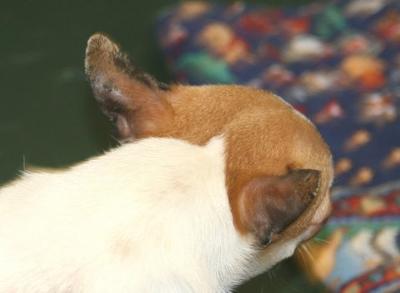Black Crust on Outer Dog Ears
by Jack Cheatwood
(Surrey BC Canada)
My chihuahua developed a black crust that formed around his outer ears at about 10 months of age. We had two BLOOD panels done on him and all came back normal. My vet prescribed a steroid cream which only made his ears bleed but did remove the black crust. It seems to come back before it goes completely away. He has also had two scrapings and no mites of any kind. He also lives with my other chi's and no one has ever gotten this. HELP!
Editor Suggestions - ear problem in dog
The dog pinna or exposed part of a dog ear is a sensitive region of the body, especially the margin or edge of the ear. There are several dog ear problems, which can cause crusting, necrosis, bleeding etc. at the tip of the ear. Parasites are considered to be the most common cause, while other less common causes may be; ear margin seborrhea, proliferative vascular necrosis or dermatophytosis etc.
Steroid cream only helps to reduce localized inflammation, as you noted that the cream helped to reduce the dog ear crusting. This is not a specific treatment for this condition.
Your dog needs other therapeutics, which can only be prescribed after a specific diagnosis is achieved.
Go for differential tests, such as for fungal infection, seborrhea and ask for a biopsy of any
In the picture you provided, it seems that the dog ear skin has turned black, which means that hyper pigmentation has occurred - specifically there is abnormal keratin activity. This indicates that it is likely that your dog is suffering from ear marginal seborrhea, which causes hyper pigmentation, a problem which gradually spreads to the concave surface of ear. This assumption should be confirmed with additional tests. We'd prefer that you consult a dermato-pathologist for confirmation of our suspicions.
Specific treatment for canine ear marginal seborrhea is to use an anti seborrhea shampoo (Clinical Care Antiparasitic and Antiseborrheic Medicated Shampoo). Your veterinarian will prescribe corticosteroids and pentoxyfillne, which is a drug used orally or topically, depending upon the status of condition. Additional systemic medications such as vitamin c, retinoids and fatty acids are prescribed for controlling an abnormal keratinization process over the ear.
For time being, to control general and localized symptoms, we suggest using the medicated anti–seborrheal shampoo mentioned above - Clinical Care Antiparasitic and Antiseborrheic Medicated Shampoo. Steroid cream is effective in controlling severe symptoms, but it is never recommended for long term use. Natural remedies such as Skin and Coat Tonic can help to improve skin health, hair and follicular strength and the status of glandular activity.
Please keep us up to date on your dog's ear condition.
Comments for Black Crust on Outer Dog Ears
|
||
|
||
|
||
|
||
|
Click here to add your own comments Join in and write your own page! It's easy to do. How? Simply click here to return to Ear. |


